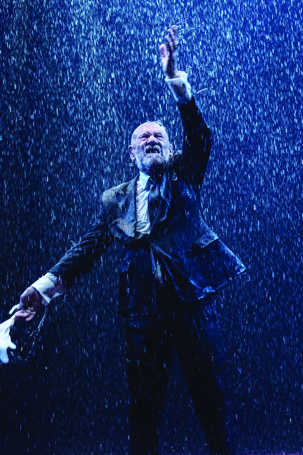Celebrity casting maybe, good acting definitely
★★★

Let me make clear from the start the ‘cock’ of the title does not refer to a penis, although there are quite a few references to penises in the play. So, no jokes about limp performances (there weren’t any), standing up at the end (they did) or Mike Bartlett’s Cock not being very long (it’s only 105 minutes).
The title alludes to a cock fight, because it’s about a love triangle in which two people are rivals for a third person’s love and he struggles to choose between them. It’s a play about an ostensibly gay couple one of whom finds himself attracted to a woman, and, although interesting questions are asked about how we define people’s sexuality, it’s primarily a comedy.
And since you ask, although sex is referred to regularly throughout the play, and it is quite erotic at times, the actors keep their clothes on and use stylised movements to indicate physical activity. I’m pretty sure no intimacy advisor was needed.
There are two star names in this play. So, let me start with their performances, and say that both earn their place on the stage, not because they’re celebrities but because they’re damn good actors.
Taron Egerton is best known for his performances in the films Rocketman and Kingsman, but he is RADA trained and has appeared at the National Theatre. Here he is the unnamed M (for Man, get it?). He gives a nuanced performance as what appears to be the dominant lover in a long term relationship. He plays to perfection this swaggering character who hides, in a very masculine way, his need for love. Mr Egerton has a wonderful ability to switch from a jaw jutting bully to soft and red-eyed with tears, and he delivers lines of waspish humour with a lashing tongue.
Jonathan Bailey is one of the many ridiculously attractive people from Bridgerton and destined to become the central character in the second series. He too has a good track record in theatre, including an Olivier Award. He plays M’s partner, the only character given a name, not that ‘John’ is much of an ID. His character is painfully indecisive. Mr Bailey provides many enjoyable moments of comedy, as he grimaces with his face and contorts his body in a child-like way, whilst avoiding making his mind up. If anything, there is just a little too much goofiness. We know he is suffering because there are moments outside of the action when he is alone and bathed in harsh light screaming silently, but in his interaction with the other characters, he doesn’t show quite enough of this angst.
Both are physically right for the parts, Mr Bailey thin and gangly, Mr Egerton stocky and muscular. Not quite Laurel and Hardy, but it would hard to imagine either playing the other role.
An impressive production
What you notice when you enter the auditorium is Merle Hensel’s impressive set. It’s chrome or some similar polished metal curved around the sides and back of the stage. There’s no escaping it. There are no distracting props and the one way in and out is a concealed revolving door. All that happens is reflected back on itself, conveying the way these characters are trapped in their relationships and unable to see beyond them. There are some hanging fluorescent strips which come down from time to time and these along with other lighting changes from dark to brilliantly bright, orchestrated by Paule Constable, match and enhance the mood changes.
First, we meet M and John. They’re relaxed in each other’s company. There’s a lot of affection. There’s also a lot of sniping and bickering, but anyone who’s been in a long term relationship will recognise how natural this is, because it is easy to get into negative ways of behaving.
However, there is a problem with this relationship. The cliché of a seven year itch perhaps. John has had sex with someone else. Shockingly for both of them, given that M is gay and until now John has thought of himself as gay, the other person is a woman. M’s dominating character and the way he resorts to unpleasantness hint at why John might have been tempted to stray. It has to be said that, while the insults may hurt John, they are funny for us to hear, for example when he launches into a string of offensive terms for someone who is attracted to women.

In the second act, we see how this other relationship began and developed. Jade Anouka (you may recognise her from His Dark Materials) is excellent as the woman with whom John has an affair and falls in love. Her character is called W (for woman). There isn’t so much potential for comedy in this part, but Ms Anouka exudes the love and need for love of her character. John shows nervousness but clear attraction, and there’s a gentleness and respect between them that wasn’t apparent in John’s relationship with M. But of course he is still attracted to M, and Mr Bailey is at his comic best when he is confused about what he wants, beyond wanting to please everybody. It is his indecisiveness that enables his lovers to mould him into what they need.
Stylised movement is moving
This is a good point to mention the way they first make love. As I said earlier, there is next to no physical intimacy beyond a kiss or a hug. They keep their clothes on. You’ll also remember I said the set is bare of any props. Throughout the play, body movement expresses thoughts and feelings without resorting to obvious mime. So much of the physical action is left to your imagination. For example, a whole meal is served in the third act without any sign of a table a bowl or cutlery.
Going back to this first encounter between John and W, they indicate through the dialogue what they are doing, while staying physically separate on stage. She wants to see his naked body. He moves his hands to indicate the shedding of clothes without literally miming taking off each item. Similarly, they describe him exploring her vagina but what we see, from memory, is him touching his leg and her using her body to express the excitement she is feeling inside. This exploration of each other’s bodies is highly erotic, proving perhaps that the best sex is in the brain. I congratulate director Marianne Elliott is for utilising this remarkably effective element, and the movement director Annie-Lunnette Deakin-Foster for making it work so well.
This and the set and the lighting could only happen in a theatre and all contribute to a complete experience that enhances what’s said. Talking of which, Mike Bartlett has an excellent ear for dialogue- just the exchanges you would expect both from a long term relationship and a first meeting.
If I have a criticism of the production, it’s that it looks too good. It’s so stylish with its cold encompassing metal and its stylised movement that it takes away some of the raw feeling from these relationships.
The third act is the cock fight. M invites W to join him and John for dinner. It feels contrived but gives us the showdown we want. M brings along his father for good measure. He’s called F (of course) and is played by Phil Daniels, in a performance that shows a parent’s blinkered affection – he wants his son to be happy- and gives us insight into the limitations of both liberal tolerance and a view that defines people by their sexuality and gender.
M and W each think John has chosen them and is going to take the opportunity to reject the other. As the evening progresses, there’s verbal sparring, and increasingly desperate emotion as it becomes clear how much each of them needs John. He meanwhile continues to be pulled one way and another both by his feelings and by what box he should tick, with the possibility that it’s all ‘cock’, as in cock and bull.
Cock is funny a lot of the time, it lectures some of the time, and it’s not as deep as I suspect it thinks it is, but as a look at the way hearts break the rules set by our brains, it’s full of insight, especially in the hands of its starry cast.
Cock is running at the Ambassadors Theatre in London until 4 June 2022
Paul received a press ticket from the producer
Watch the review of Cock on YouTube


